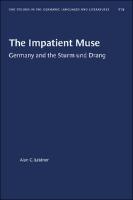The Impatient Muse
Germany and the Sturm und Drang
| dc.contributor.author | Leidner, Alan C. | |
| dc.date.accessioned | 2020-06-23T07:42:45Z | |
| dc.date.available | 2020-06-23T07:42:45Z | |
| dc.date.issued | 1994 | |
| dc.identifier | ONIX_20200623_9781469656731_112 | |
| dc.identifier.uri | https://library.oapen.org/handle/20.500.12657/39864 | |
| dc.description.abstract | Far from being a forerunner of Weimar Classicism or an addendum to the Enlightenment, the Sturm und Drang is best seen as part of an autonomous culture of impatience—as literature in which Germans, frustrated with their fragmented land, simulated a sense of power and effectiveness that political realities did not afford. This impatience drove not only authors and the characters they created; it also drew in German audiences and readers ready to partake vicariously in national sentiments that they otherwise could not have experienced. Alan Leidner sees Lavater's work as a model for dealing with a limiting culture, Goethe's Werther as a subtly arrogant figure, the drama of the "Kraftmensch" as a literature legitimizing the violence of its protagonists, the famous split in the "Urfaust" as the result of Goethe's resistance to the impatience that led many writers to fabricate a German nation that did not exist, and Schiller's "Die Räuber" as a liberating ritual that allowed German audiences to enjoy temporary feelings of national community. He concludes his study with an analysis of J. M. R. Lenz, whose texts recoil unequivocally in the face of the impatient muse. | |
| dc.language | English | |
| dc.relation.ispartofseries | UNC Studies in the Germanic Languages and Literatures | |
| dc.subject.classification | thema EDItEUR::D Biography, Literature and Literary studies::D Biography, Literature and Literary studies::DS Literature: history and criticism | en_US |
| dc.subject.other | German Studies | |
| dc.subject.other | Literature | |
| dc.title | The Impatient Muse | |
| dc.title.alternative | Germany and the Sturm und Drang | |
| dc.type | book | |
| oapen.identifier.doi | 10.5149/9781469656731_Leidner | |
| oapen.relation.isPublishedBy | 29b4cf74-8c0a-422f-9d27-e862ca722861 | |
| oapen.relation.isFundedBy | 0314e571-4102-4526-b014-3ed8f2d6750a | |
| oapen.relation.isFundedBy | 0cdc3d7c-5c59-49ed-9dba-ad641acd8fd1 | |
| oapen.series.number | 115 | |
| oapen.pages | 168 | |
| oapen.place.publication | Chapel Hill | |
| oapen.grant.number | [grantnumber unknown] | |
| oapen.grant.number | [grantnumber unknown] | |
| oapen.grant.program | Humanities Open Book Program | |
| oapen.grant.program | Humanities Open Book Program |

